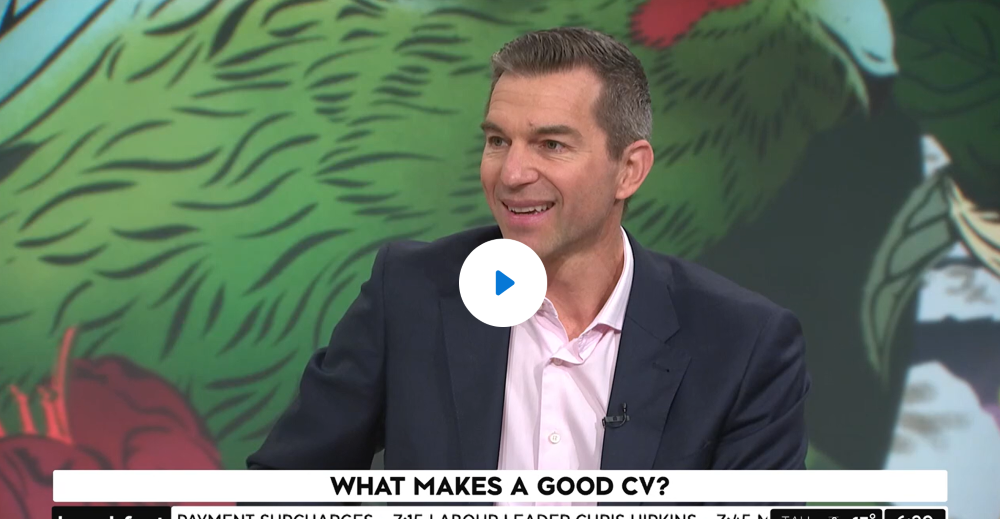July 22, 2024
Become Match Fit For Your Executive Job Search
by
Tony Pownall
We've worked with quite a number of executive level candidates this year as a result of our growing presence in executive appointments. This article is a collection of commonly asked questions, mistakes made, and general advice on how to approach the search for your next executive role. Some content also stems from my own experience, having previously run a $30m division of a global recruitment firm and finding myself unemployed after a 15 year tenure just as the 2020 lockdowns hit.
We've worked with quite a number of executive level candidates this year as a result of our growing presence in executive appointments. This article is a collection of commonly asked questions, mistakes made, and general advice on how to approach the search for your next executive role. Some content also stems from my own experience, having previously run a $30m division of a global recruitment firm and finding myself unemployed after a 15 year tenure just as the 2020 lockdowns hit.

Timing and Mindset
There’s a correlation between the level of responsibility and impact of our roles and our sense of loyalty or commitment to a business and its people. You’re more invested than the average employee. For those with a longer tenure in particular, it’s hard knowing the right time to leave. It’s also difficult to free up the headspace and time to give to a search as we’re used to giving the role 100%.
If you’re starting to resent decisions or colleagues or find yourself more cynical, you’ve overstayed your welcome. Be careful, this creeps up on you.
Consciously carve out time each week to take action on your search and make peace with the fact that you’re giving the current role 95% commitment from here. Otherwise, intention never translates to enough action.
Leaving Without Another Role
Over the last 12 months, I’ve spoken to a large number of executives who have given notice without a role to go to. For some, it’s been a particularly demanding last few years, and I think burnout and mental exhaustion have partly driven this trend. Some have spoken about the need to freshen up, take stock, spend time with family, and reset before reloading the burden of running a division, function, or business.
Assuming you’ve done your sums and can afford to, I get it. The mental separation, freshness, and extra time can help. However, just beware of the downside – our sense of self-worth is intrinsically tied to our roles, and suddenly not being needed or depended upon professionally can hurt our egos and confidence more than we expect. We’re used to being needed. My advice if you’re in this position is:
1. Enjoy the journey: Allow yourself a short guilt-free break with family and be kind to yourself. It’ll work out in the end. Try to be present. It’s a rare chance for self-discovery and “you” time.
2. Have a plan: Set goals and structure for your search (covered next). Focusing on your plan takes pressure off.
3. Volunteering or mentoring: This was a saviour for me, and I know others have felt the same. Apply yourself to a cause, even for a one-off event or a few hours a week. Giving back is extremely fulfilling and provides that feeling of being needed again, which is important for our confidence at a time we can more easily feel disconnected. I engaged with the CEO of a not-for-profit I’d worked with through my last role and ended up mentoring two new leaders in that organisation who were struggling. Super rewarding.
4. Training: Is there a course (professional or personal) you’ve been meaning to explore but been too busy? Now’s the time. What about physical training? Now’s a great time to set some health goals while you have a bit more time.
5. Consulting or contracting: I love the phrase someone used on me – “extend your runway.” Who in your network needs help with an issue or project? Something to keep you busy 3-4 days a week and maintain cash flow. This removes anxiety and pressure from the permanent job search and retains the sense of purpose.
Project Plan
The advice I was given was to treat your search like a project, but the goal is not a new role ironically, that’s the outcome of actionable goals you set yourself and control. Break the project into three steps:
1. Preparation and you time: Month 1
Get your CV in order, consider your value proposition, and write yourself a brief for your next role. Be able to answer questions like “What is important to you?”, “What are you looking for next?”, and “What unique skill set or value do you bring to a role or organisation?”.
2. Networking and exploration: Months 2 - 3
Set goals around reconnecting with past colleagues, managers, or suppliers. Very few people do this enough, so now’s the time to catch up. During my period of unemployment, I challenged myself to have three coffees a week with my network. This is the exploration stage: understanding what’s happening in others' worlds and where opportunities might lie that you hadn’t considered. For those not working, this is when you’ll uncover issues or projects where you could ‘extend your runway’ via contracting. These opportunities won’t come to you, so you must uncover needs within your network.
3. Application: Months 2-6
This is the stage when you’ll become really active applying for roles, linking up with recruiters, and chasing opportunities, and hopefully fending off approaches! By doing steps 1 and 2 first, you’ll be in better shape to sell yourself, as you would’ve refined your ‘pitch’ having talked it through with your network. By the time you speak to recruiters and employers, you’ll be 100% clear on your story and value proposition.
Networking
Your network can be more powerful than you think if used wisely. Who you know trumps what you know in this country. However, it’s one thing to ‘check in’ with someone, but the real value comes from identifying specific outcomes you want from each conversation:
1. Ask for feedback on your CV and practice your job brief and pitch, starting with the ‘safe’ contacts who know you best.
2. Uncover issues or challenges they’re encountering. This helps uncover contracting opportunities but also helps you get a broad sense of the market. With all this networking, you’ll quickly become a connector in your own right, sharing insights and adding value to others in subsequent conversations.
3. Ask for a referral or introduction. The name of someone they think is worth you connecting with. This was possibly the best advice I received. Having started with a modest list of names, I was almost a little embarrassed about how short the list was – maybe 12 from memory. By the time I was finished, I had more referrals and introductions than I could get through. One job seeker challenged the value of this given they wanted to get out of the industry that had dominated their career, and therefore network. However, they quickly realised their connections knew others who had previously transitioned out of the industry to refer them to, who importantly appreciated the transferable skills they could bring.
CV
You would have recruited a lot of people yourself, but strangely that doesn’t make writing your own CV any easier. It’s a hard document to write, I rewrote mine about 3-4 times. Here are my tips:
Summary: Most people start their CV with a short paragraph. Make it less than 10 lines and avoid corporate jargon and platitudes. I sense that in an effort to impress, many use a tone that is a bit corporate, impersonal, and generic. If yours starts with “I’m a transformational executive leader with a proven track record of driving business outcomes…”, then rethink it. It needs to sum up your unique skill set, what is important to you, and your passion in plain language that is human, authentic, and gives me some insight into the person behind the CV – the unique set of perspectives and value you bring. It’s harder to write this way but a lot more powerful.
CV length: I see 1-2 page Executive CVs. That’s too short to do your experience justice and give me any depth to your achievements. I created a 1-pager for myself, but that was more a capability statement: the problems I can solve, evidence of where I’ve solved them previously, and testimonials from those who have experienced this. This was useful as a way to refine my pitch and as an intro for contracting, but not to support an application. Conversely, keep it under 5 pages.
Experience: Under each role, start with a sentence on the business (industry, market position, scale, etc.), then role (purpose, scale, budgets, reporting line, and what you inherited, i.e., the challenge). I shouldn’t have to Google your prior companies. Thereafter, focus on key achievements, supported by specific proof. These will explain your role responsibilities without having to relist those in full. It’s useful to state the reason for leaving between each role also.
You, the person: Beyond the summary, weave in aspects that give a glimpse into you, your interests, and personality.
Working With Recruiters / Managing Your Application
Ask around for recommendations and reach out to a few executive recruiters, then build a relationship with the 2-3 you best connect with via agreed periodic check-ins. Unlike other recruiters, those operating at the CXO level tend not to specialise by role but by industry and/or company. So, it’s harder for us to talent pool in advance as we don’t have the same control over the type of role we’ll next recruit. Therefore, a 15-minute Teams introduction might be the extent of the initial engagement – don’t take offence. If I had coffee with every Executive that offered, I wouldn’t get my job done.
ALWAYS FOLLOW UP YOUR APPLICATION! Preferably by phone. Give it 72 hours and reach out, always. During my most recent appointment, a CIO role, I had texts, LinkedIn requests, emails, and voicemails despite offering my mobile number in the campaign with the offer of a conversation as required. If I have your application, another email reminding me of that isn’t helpful.
Personally, I see a correlation between those that track me down on the phone and those that progress. Calling with the purpose of reiterating your interest, and a short summary of why you saw a match will cause me to open your CV and potentially ask you the questions I would have anyway had I called you.
The Assessment Process
Clearly, you need to prepare for competency-based interviewing, and clues for the behaviours required for success will come from an advertisement or call with the recruiter. I’ve started sending the core competencies required along with my candidate information pack. If you’re in doubt about exactly what will be covered at the interview, you must ask. Never attend an interview without knowing this. Most senior candidates I interview are pretty good with this aspect, but not all.
The area where many do let themselves down in interviews is telling their professional story. This takes some practice and structure to do well. Personally, I’ll judge how you tell your own story as an indication of how you might tell any story or narrative, an important aspect of Executive roles. So, if given the chance, talk through your professional background in reverse chronological order covering:
1. Why you left the role prior
2. Summary of the new/current company and role
3. What you inherited (state of the nation). Most senior roles come with a particular challenge or mandate.
4. An achievement of note
5. The state of play on departure (shows how you delivered to the challenge)
Keep it tight and punchy and practice it. Of course, you know your own professional history but being able to tell your story in a compelling way without waffling is not as common as I’d expect.
Navigating an executive job search requires careful planning, strategic networking, and a proactive approach. Remember to carve out time for your search, and leverage your network effectively. Treat your job search like a project with clear goals and actionable steps, and ensure your CV authentically represents your unique skills and experiences. Collaborate with recruiters and follow up on your applications diligently. Lastly, practice telling your professional story in a compelling way.
Best of luck in your job search. With the right mindset and preparation, you’ll find the next exciting chapter in your career. For more information about your executive job search, or looking to recruit an executive role yourself, get in touch with Craig or Tony. If you feel more tailored coaching and support is required we highly recommend our friends at My Career Brand.




